Deck 16: Waves and Sound
Question
Question
Question
Question
Question
Question
Question
Question
Question
Question
Question
Question
Question
Question
Question
Question
Question
Question
Question
Question
Question
Question
Question
Question
Question
Question
Question
Question
Question
Question
Question
Question
Question
Question
Question
Question
Question
Question
Question
Question
Question
Question
Question
Question
Question
Question
Question
Question
Question
Question
Question
Question
Question
Question
Question
Question
Question
Question
Question
Question
Question
Question
Question
Question
Question
Question
Question

Unlock Deck
Sign up to unlock the cards in this deck!
Unlock Deck
Unlock Deck
1/67
Play
Full screen (f)
Deck 16: Waves and Sound
1
Two canoes are 10 m apart on a lake. Each bobs up and down with a period of 8.0 seconds. When one canoe is at its highest point, the other canoe is at its lowest point. Both canoes are always within a single cycle of the waves. Determine the speed of the waves.
A)2.5 m/s
B)1.3 m/s
C)5.0 m/s
D)0.65 m/s
E)0.75 m/s
A)2.5 m/s
B)1.3 m/s
C)5.0 m/s
D)0.65 m/s
E)0.75 m/s
2.5 m/s
2
Which one of the following statements concerning waves is false?
A)A wave can have both transverse and longitudinal components.
B)A wave carries energy from one place to another.
C)A wave does not result in the bulk flow of the material of its medium.
D)A wave is a traveling disturbance.
E)A transverse wave is one in which the disturbance is parallel to the direction of travel.
A)A wave can have both transverse and longitudinal components.
B)A wave carries energy from one place to another.
C)A wave does not result in the bulk flow of the material of its medium.
D)A wave is a traveling disturbance.
E)A transverse wave is one in which the disturbance is parallel to the direction of travel.
A transverse wave is one in which the disturbance is parallel to the direction of travel.
3
Which one of the following waves is purely longitudinal?
A)sound waves in air
B)microwaves traveling through air
C)radio waves traveling through vacuum
D)waves on a plucked violin string
E)surface waves in a shallow pan of water
A)sound waves in air
B)microwaves traveling through air
C)radio waves traveling through vacuum
D)waves on a plucked violin string
E)surface waves in a shallow pan of water
sound waves in air
4
A periodic wave travels along a stretched string in the direction shown by the arrow. The sketch shows a "snapshot" of the pulse at a certain instant. Points A, B, and C are on the string. Which entry in the table below correctly describes how particles of string between A and B and between B and C are moving? 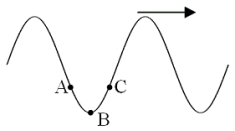 between A and B between B and C
between A and B between B and C
A)down down
B)up down
C)left right
D)up up
E)down up
 between A and B between B and C
between A and B between B and CA)down down
B)up down
C)left right
D)up up
E)down up

Unlock Deck
Unlock for access to all 67 flashcards in this deck.
Unlock Deck
k this deck
5
A wave moves at a constant speed along a string. Which one of the following statements is false concerning the motion of particles in the string?
A)The particle speed is constant.
B)The particle speed is not the same as the wave speed.
C)The particle speed depends on the amplitude of the periodic motion of the source.
D)The particle speed depends on the frequency of the periodic motion of the source.
E)The particle speed is independent of the tension and linear density of the string.
A)The particle speed is constant.
B)The particle speed is not the same as the wave speed.
C)The particle speed depends on the amplitude of the periodic motion of the source.
D)The particle speed depends on the frequency of the periodic motion of the source.
E)The particle speed is independent of the tension and linear density of the string.

Unlock Deck
Unlock for access to all 67 flashcards in this deck.
Unlock Deck
k this deck
6
What is the wavelength of a wave with a speed of 9.0 m/s and a period of 0.33 s?
A)0.33 m
B)1.5 m
C)3.0 m
D)13 m
E)27 m
A)0.33 m
B)1.5 m
C)3.0 m
D)13 m
E)27 m

Unlock Deck
Unlock for access to all 67 flashcards in this deck.
Unlock Deck
k this deck
7
The speed of sound in a certain metal block is 2.00 × 103 m/s. The graph shows the amplitude (in meters) of a wave traveling through the block versus time (in milliseconds). What is the wavelength of this wave? 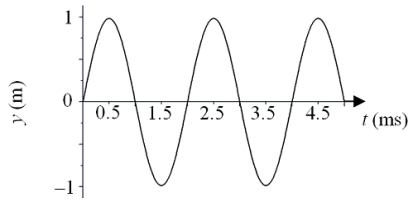
A)0.5 m
B)1.5 m
C)3.0 m
D)4.0 m
E)6.0 m

A)0.5 m
B)1.5 m
C)3.0 m
D)4.0 m
E)6.0 m

Unlock Deck
Unlock for access to all 67 flashcards in this deck.
Unlock Deck
k this deck
8
The tension in a taut rope is increased by a factor of 9. How does the speed of wave pulses on the rope change, if at all?
A)The speed remains the same.
B)The speed is reduced by a factor of 3.
C)The speed is reduced by a factor of 9.
D)The speed is increased by a factor of 3.
E)The speed is increased by a factor of 9.
A)The speed remains the same.
B)The speed is reduced by a factor of 3.
C)The speed is reduced by a factor of 9.
D)The speed is increased by a factor of 3.
E)The speed is increased by a factor of 9.

Unlock Deck
Unlock for access to all 67 flashcards in this deck.
Unlock Deck
k this deck
9
A wave has a frequency of 58 Hz and a speed of 31 m/s. What is the wavelength of this wave?
A)1.9 m
B)3.5 m
C)0.29 m
D)0.53 m
E)31 m
A)1.9 m
B)3.5 m
C)0.29 m
D)0.53 m
E)31 m

Unlock Deck
Unlock for access to all 67 flashcards in this deck.
Unlock Deck
k this deck
10
A periodic wave is produced on a stretched string. Which one of the following properties is not related to the speed of the wave?
A)frequency
B)amplitude
C)period
D)wavelength
E)tension in the string
A)frequency
B)amplitude
C)period
D)wavelength
E)tension in the string

Unlock Deck
Unlock for access to all 67 flashcards in this deck.
Unlock Deck
k this deck
11
The displacement of a vibrating string versus position along the string is shown in the figure. The periodic waves have a speed of 10.0 cm/s. A and B are two points on the string. 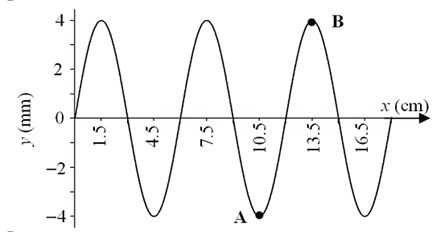
What is the frequency of the wave?
A)0.60 Hz
B)0.90 Hz
C)1.1 Hz
D)1.3 Hz
E)1.7 Hz

What is the frequency of the wave?
A)0.60 Hz
B)0.90 Hz
C)1.1 Hz
D)1.3 Hz
E)1.7 Hz

Unlock Deck
Unlock for access to all 67 flashcards in this deck.
Unlock Deck
k this deck
12
A certain string on a piano is tuned to produce middle C (f = 261.63 Hz) by carefully adjusting the tension in the string. For a fixed wavelength, what is the frequency when this tension is tripled?
A)87.21 Hz
B)151.05 Hz
C)370.00 Hz
D)453.16 Hz
E)784.89 Hz
A)87.21 Hz
B)151.05 Hz
C)370.00 Hz
D)453.16 Hz
E)784.89 Hz

Unlock Deck
Unlock for access to all 67 flashcards in this deck.
Unlock Deck
k this deck
13
A transverse periodic wave described by the expression  (where y and x are in meters and t is in seconds) is established on a string. Which one of the following statements concerning this wave is false?
(where y and x are in meters and t is in seconds) is established on a string. Which one of the following statements concerning this wave is false?
A)The wave is traveling in the negative x direction.
B)The amplitude is 1.0 m.
C)The frequency of the wave is 0.10 Hz.
D)The wavelength of this wave is 2.0 m.
E)The wave travels with speed 5.0 m/s.
 (where y and x are in meters and t is in seconds) is established on a string. Which one of the following statements concerning this wave is false?
(where y and x are in meters and t is in seconds) is established on a string. Which one of the following statements concerning this wave is false?A)The wave is traveling in the negative x direction.
B)The amplitude is 1.0 m.
C)The frequency of the wave is 0.10 Hz.
D)The wavelength of this wave is 2.0 m.
E)The wave travels with speed 5.0 m/s.

Unlock Deck
Unlock for access to all 67 flashcards in this deck.
Unlock Deck
k this deck
14
The displacement of a vibrating string versus position along the string is shown in the figure. The periodic waves have a speed of 10.0 cm/s. A and B are two points on the string. 
-What is the difference in phase between the points A and B?
A)( /4)radians
B)( /2)radians
C) radians
D)(3 /4)radians
E)2 radians

-What is the difference in phase between the points A and B?
A)( /4)radians
B)( /2)radians
C) radians
D)(3 /4)radians
E)2 radians

Unlock Deck
Unlock for access to all 67 flashcards in this deck.
Unlock Deck
k this deck
15
The displacement of a vibrating string versus position along the string is shown in the figure. The periodic waves have a speed of 10.0 cm/s. A and B are two points on the string. 
What is the amplitude of the wave?
A)2 mm
B)4 mm
C)8 mm
D)12 mm
E)16 mm

What is the amplitude of the wave?
A)2 mm
B)4 mm
C)8 mm
D)12 mm
E)16 mm

Unlock Deck
Unlock for access to all 67 flashcards in this deck.
Unlock Deck
k this deck
16
A steel wire of mass 0.400 kg and length 0.640 m supports a 102-kg block. The wire is struck exactly at its midpoint causing a small displacement. How long does it take the peak of this displacement to reach the top of the wire? 
A)2.00 × 10-3 s
B)4.00 × 10-3 s
C)6.00 × 10-3 s
D)8.00 × 10-3 s
E)1.60 × 10-2 s

A)2.00 × 10-3 s
B)4.00 × 10-3 s
C)6.00 × 10-3 s
D)8.00 × 10-3 s
E)1.60 × 10-2 s

Unlock Deck
Unlock for access to all 67 flashcards in this deck.
Unlock Deck
k this deck
17
The displacement of a vibrating string versus position along the string is shown in the figure. The periodic waves have a speed of 10.0 cm/s. A and B are two points on the string. 
What is the wavelength of the wave?
A)3.0 cm
B)6.0 cm
C)9.0 cm
D)12 cm
E)15 cm

What is the wavelength of the wave?
A)3.0 cm
B)6.0 cm
C)9.0 cm
D)12 cm
E)15 cm

Unlock Deck
Unlock for access to all 67 flashcards in this deck.
Unlock Deck
k this deck
18
A wave has an amplitude of 0.35 m, a frequency of 1.05 × 106 Hz, and travels in the positive x direction at the speed of light, 3.00 × 108 m/s. Which one of the following equations correctly represents this wave?
A)y = 0.35 sin (6.60 × 106t - 0.022x)
B)y = 0.35 sin (6.60 × 106t + 0.022x)
C)y = 0.35 sin (286t - 1.05 × 106x)
D)y = 0.35 sin (286t + 1.05 × 106x)
E)y = 0.35 sin (1.05 × 106t + 3.00 × 108x)
A)y = 0.35 sin (6.60 × 106t - 0.022x)
B)y = 0.35 sin (6.60 × 106t + 0.022x)
C)y = 0.35 sin (286t - 1.05 × 106x)
D)y = 0.35 sin (286t + 1.05 × 106x)
E)y = 0.35 sin (1.05 × 106t + 3.00 × 108x)

Unlock Deck
Unlock for access to all 67 flashcards in this deck.
Unlock Deck
k this deck
19
A wave is traveling at 35 m/s on a string with a linear density of 0.082 kg/m. What is the tension in the string?
A)0.28 N
B)0.56 N
C)2.5 N
D)5.0 N
E)10 N
A)0.28 N
B)0.56 N
C)2.5 N
D)5.0 N
E)10 N

Unlock Deck
Unlock for access to all 67 flashcards in this deck.
Unlock Deck
k this deck
20
Of the three traveling waves listed below, which one(s) is(are) traveling in the +x direction? 
A)1 only
B)2 only
C)3 only
D)1, 2, and 3
E)2 and 3 only

A)1 only
B)2 only
C)3 only
D)1, 2, and 3
E)2 and 3 only

Unlock Deck
Unlock for access to all 67 flashcards in this deck.
Unlock Deck
k this deck
21
A transverse wave is traveling in the -x direction on a string that has a linear density of 0.011 kg/m. The tension in the string is 7.4 N. The amplitude of the wave is 0.017 m; and its wavelength is 1.5 m. Which one of the following is the correct equation for the displacement of a particle from its equilibrium position?
A)y = (0.017 m)sin[(84 Hz)t + (4.2 m-1)x]
B)y = (0.017 m)sin[(110 Hz)t + (4.2 m-1)x]
C)y = (4.2 m)sin[(84 Hz)t + (59 m-1)x]
D)y = (4.2 m)sin[(110 Hz)t - (59 m-1)x]
E)y = (0.017 m)sin[(110 Hz)t - (8.4 m-1)x]
A)y = (0.017 m)sin[(84 Hz)t + (4.2 m-1)x]
B)y = (0.017 m)sin[(110 Hz)t + (4.2 m-1)x]
C)y = (4.2 m)sin[(84 Hz)t + (59 m-1)x]
D)y = (4.2 m)sin[(110 Hz)t - (59 m-1)x]
E)y = (0.017 m)sin[(110 Hz)t - (8.4 m-1)x]

Unlock Deck
Unlock for access to all 67 flashcards in this deck.
Unlock Deck
k this deck
22
A bell is ringing inside of a sealed glass jar that is connected to a vacuum pump. Initially, the jar is filled with air. What does one hear as the air is slowly removed from the jar by the pump?
A)The sound intensity from the bell gradually decreases.
B)The frequency of the sound from the bell gradually increases.
C)The frequency of the sound from the bell gradually decreases.
D)The speed of the sound from the bell gradually increases.
E)The intensity of the sound from the bell does not change.
A)The sound intensity from the bell gradually decreases.
B)The frequency of the sound from the bell gradually increases.
C)The frequency of the sound from the bell gradually decreases.
D)The speed of the sound from the bell gradually increases.
E)The intensity of the sound from the bell does not change.

Unlock Deck
Unlock for access to all 67 flashcards in this deck.
Unlock Deck
k this deck
23
The Young's modulus of aluminum (density = 2700 kg/m3) is 6.9 × 1010 N/m2. Determine the speed of sound in an aluminum rod.
A)1.4 × 103 m/s
B)2.5 × 103 m/s
C)5.1 × 103 m/s
D)6.3 × 103 m/s
E)7.0 × 103 m/s
A)1.4 × 103 m/s
B)2.5 × 103 m/s
C)5.1 × 103 m/s
D)6.3 × 103 m/s
E)7.0 × 103 m/s

Unlock Deck
Unlock for access to all 67 flashcards in this deck.
Unlock Deck
k this deck
24
A bell emits sound energy uniformly in all directions at a rate of 4.00 × 10-3 W. What is the intensity of the wave 100.0 m from the bell?
A)3.18 × 10-8 W/m2
B)3.14 × 10-7 W/m2
C)5.02 × 10-2 W/m2
D)5.02 × 102 W/m2
E)6.28 × 107 W/m2
A)3.18 × 10-8 W/m2
B)3.14 × 10-7 W/m2
C)5.02 × 10-2 W/m2
D)5.02 × 102 W/m2
E)6.28 × 107 W/m2

Unlock Deck
Unlock for access to all 67 flashcards in this deck.
Unlock Deck
k this deck
25
Two fans are watching a baseball game from different positions. One fan is located directly behind home plate, 18.3 m from the batter. The other fan is located in the centerfield bleachers, 127 m from the batter. Both fans observe the batter strike the ball at the same time (because the speed of light is about a million times faster than that of sound), but the fan behind home plate hears the sound first. What is the time difference between hearing the sound at the two locations? Use 345 m/s as the speed of sound.
A)0.316 s
B)0.368 s
C)3.17 s
D)1.89 s
E)0.053 s
A)0.316 s
B)0.368 s
C)3.17 s
D)1.89 s
E)0.053 s

Unlock Deck
Unlock for access to all 67 flashcards in this deck.
Unlock Deck
k this deck
26
A transverse periodic wave is established on a string. The wave is described by the expression  where y is in meters when x and t are in meters and seconds, respectively. If the wave travels with a speed of 20.0 m/s, what is its frequency, f?
where y is in meters when x and t are in meters and seconds, respectively. If the wave travels with a speed of 20.0 m/s, what is its frequency, f?
A)0.16 Hz
B)0.64 Hz
C)31.9 Hz
D)63.7 Hz
E)400 Hz
 where y is in meters when x and t are in meters and seconds, respectively. If the wave travels with a speed of 20.0 m/s, what is its frequency, f?
where y is in meters when x and t are in meters and seconds, respectively. If the wave travels with a speed of 20.0 m/s, what is its frequency, f?A)0.16 Hz
B)0.64 Hz
C)31.9 Hz
D)63.7 Hz
E)400 Hz

Unlock Deck
Unlock for access to all 67 flashcards in this deck.
Unlock Deck
k this deck
27
When one person was talking in a small room, the sound intensity level was 60 dB everywhere within the room. Then, there were 14 people talking in similar manner simultaneously in the room, what was the resulting sound intensity level?
A)60 dB
B)79 dB
C)71 dB
D)64 dB
E)69 dB
A)60 dB
B)79 dB
C)71 dB
D)64 dB
E)69 dB

Unlock Deck
Unlock for access to all 67 flashcards in this deck.
Unlock Deck
k this deck
28
A stationary railroad whistle is sounded. An echo is heard 5.0 seconds later by the train's engineer. If the speed of sound is 343 m/s, how far away is the reflecting surface?
A)68 m
B)140 m
C)860 m
D)1700 m
E)2000 m
A)68 m
B)140 m
C)860 m
D)1700 m
E)2000 m

Unlock Deck
Unlock for access to all 67 flashcards in this deck.
Unlock Deck
k this deck
29
Castor oil has a density of 956 kg/m3. If the speed of sound in castor oil is 1474 m/s, what is its adiabatic bulk modulus?
A)1.77 × 109 N/m2
B)2.08 × 109 N/m2
C)5.71 × 109 N/m2
D)8.90 × 109 N/m2
E)9.22 × 109 N/m2
A)1.77 × 109 N/m2
B)2.08 × 109 N/m2
C)5.71 × 109 N/m2
D)8.90 × 109 N/m2
E)9.22 × 109 N/m2

Unlock Deck
Unlock for access to all 67 flashcards in this deck.
Unlock Deck
k this deck
30
A physics student is asked to determine the length of a long, slender, copper bar by measuring the time required for a sound pulse to travel the length of the bar. The Young's modulus of copper is 1.1 × 1011 N/m2; and its density is 8890 kg/m3. The student finds that the time for the pulse to travel from one end to the other is 5.6 × 10-4 s. How long is the rod?
A)11 m
B)7.8 m
C)5.5 m
D)2.0 m
E)0.45 m
A)11 m
B)7.8 m
C)5.5 m
D)2.0 m
E)0.45 m

Unlock Deck
Unlock for access to all 67 flashcards in this deck.
Unlock Deck
k this deck
31
During a typical workday (eight hours), the average sound intensity arriving at Larry's ear is 1.8 × 10-5 W/m2. If the area of Larry's ear through which the sound passes is 2.1 × 10-3 m2, what is the total energy entering each of Larry's ears during the workday?
A)1.8 × 10-5 J
B)2.2 × 10-4 J
C)7.4 × 10-4 J
D)1.1 × 10-3 J
E)4.1 × 10-3 J
A)1.8 × 10-5 J
B)2.2 × 10-4 J
C)7.4 × 10-4 J
D)1.1 × 10-3 J
E)4.1 × 10-3 J

Unlock Deck
Unlock for access to all 67 flashcards in this deck.
Unlock Deck
k this deck
32
The speaker and two microphones shown in the figure are arranged inside a sealed container filled with neon gas. The wires from the microphones are connected to an oscilloscope (not shown). The signal from the microphones is monitored beginning at time t = 0 s when a sound pulse is emitted from the speaker. The pulse is picked up by microphone 1 at t1 = 1.150 × 10-2 s and by microphone 2 at t2 = 1.610 × 10-2 s. What is the speed of sound in neon gas? 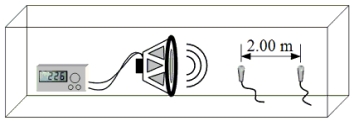
A)124 m/s
B)174 m/s
C)362 m/s
D)435 m/s
E)724 m/s

A)124 m/s
B)174 m/s
C)362 m/s
D)435 m/s
E)724 m/s

Unlock Deck
Unlock for access to all 67 flashcards in this deck.
Unlock Deck
k this deck
33
A guitar string is plucked and set into vibration. The vibrating string disturbs the surrounding air, resulting in a sound wave. Which entry in the table below is correct? wave in the string sound wave in air
A)The wave is transverse. yes yes
B)The wave speed increases no yes if the temperature rises.
C)The wave is longitudinal. yes yes
D)The wave is transmitted no yes by particle vibrations.
E)The wave transports energy. yes no
A)The wave is transverse. yes yes
B)The wave speed increases no yes if the temperature rises.
C)The wave is longitudinal. yes yes
D)The wave is transmitted no yes by particle vibrations.
E)The wave transports energy. yes no

Unlock Deck
Unlock for access to all 67 flashcards in this deck.
Unlock Deck
k this deck
34
Two children setup a "telephone" by placing a long, slender aluminum (Y = 6.9 × 1010 N/m2) rod that has a length of 6.1-m between their two houses. To communicate, a child taps a coded message on one end. How long do the sound waves take to reach the other end? Note: the density of aluminum is 2700 kg/m3.
A)1.2 × 10-3 s
B)2.4 × 10-7 s
C)8.0 × 10-6 s
D)6.3 × 10-5 s
E)1.1 × 10-4 s
A)1.2 × 10-3 s
B)2.4 × 10-7 s
C)8.0 × 10-6 s
D)6.3 × 10-5 s
E)1.1 × 10-4 s

Unlock Deck
Unlock for access to all 67 flashcards in this deck.
Unlock Deck
k this deck
35
Two boys are whispering in the library. The radiated sound power from one boy's mouth is 1.2 × 10-9 W; and it spreads out uniformly in all directions. What is the minimum distance the boys must be away from the librarian so that she will not be able to hear them? The threshold of hearing for the librarian is 1.00 × 10-12 W/m2.
A)100 m
B)35 m
C)23 m
D)16 m
E)9.8 m
A)100 m
B)35 m
C)23 m
D)16 m
E)9.8 m

Unlock Deck
Unlock for access to all 67 flashcards in this deck.
Unlock Deck
k this deck
36
How far must one stand from a 5-mW point sound source if the intensity at that location is at the hearing threshold? Assume the sound waves travel to the listener without being disturbed.
A)500 m
B)1 km
C)2 km
D)4 km
E)20 km
A)500 m
B)1 km
C)2 km
D)4 km
E)20 km

Unlock Deck
Unlock for access to all 67 flashcards in this deck.
Unlock Deck
k this deck
37
The decibel level of a jackhammer is 125 dB relative to the threshold of hearing. Determine the sound intensity produced by the jackhammer.
A)1.0 W/m2
B)3.2 W/m2
C)4.8 W/m2
D)12 W/m2
E)88 W/m2
A)1.0 W/m2
B)3.2 W/m2
C)4.8 W/m2
D)12 W/m2
E)88 W/m2

Unlock Deck
Unlock for access to all 67 flashcards in this deck.
Unlock Deck
k this deck
38
A transverse periodic wave on a string with a linear density of 0.200 kg/m is described by the following equation: y = 0.08 sin(469t - 28.0x), where x and y are in meters and t is in seconds. What is the tension in the string?
A)3.99 N
B)32.5 N
C)56.1 N
D)65.8 N
E)79.6 N
A)3.99 N
B)32.5 N
C)56.1 N
D)65.8 N
E)79.6 N

Unlock Deck
Unlock for access to all 67 flashcards in this deck.
Unlock Deck
k this deck
39
The intensity of a spherical wave 2.5 m from the source is 120 W/m2. What is the intensity at a point 9.0 m away from the source?
A)9.3 W/m2
B)24 W/m2
C)53 W/m2
D)80 W/m2
E)270 W/m2
A)9.3 W/m2
B)24 W/m2
C)53 W/m2
D)80 W/m2
E)270 W/m2

Unlock Deck
Unlock for access to all 67 flashcards in this deck.
Unlock Deck
k this deck
40
The speed of sound in fresh water at 293 K is 1482 m/s. At what temperature is the speed of sound in helium gas the same as that of fresh water at 293 K? Helium is considered a monatomic ideal gas ( = 1.67 and atomic mass = 4.003 u).
A)313 K
B)377 K
C)442 K
D)525 K
E)633 K
A)313 K
B)377 K
C)442 K
D)525 K
E)633 K

Unlock Deck
Unlock for access to all 67 flashcards in this deck.
Unlock Deck
k this deck
41
According to US government regulations, the maximum sound intensity level in the workplace is 90.0 dB. Within one factory, 32 identical machines produce a sound intensity level of 92.0 dB. How many machines must be removed to bring the factory into compliance with the regulation?
A)2
B)8
C)12
D)16
E)24
A)2
B)8
C)12
D)16
E)24

Unlock Deck
Unlock for access to all 67 flashcards in this deck.
Unlock Deck
k this deck
42
The car in the drawing is moving to the left at 35 m/s. The car's horn continuously emits a 2.20 × 102 Hz sound. The figure also shows the first two regions of compression of the emitted sound waves. The speed of sound is 343 m/s. 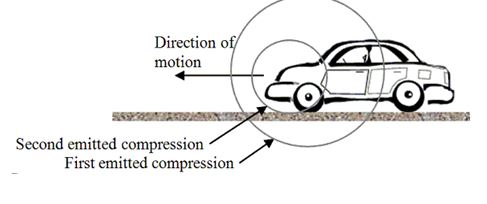
What is the frequency heard by a stationary observer standing in front of the car?
A)9.7 Hz
B)176 Hz
C)200 Hz
D)219 Hz
E)245 Hz

What is the frequency heard by a stationary observer standing in front of the car?
A)9.7 Hz
B)176 Hz
C)200 Hz
D)219 Hz
E)245 Hz

Unlock Deck
Unlock for access to all 67 flashcards in this deck.
Unlock Deck
k this deck
43
The car in the drawing is moving to the left at 35 m/s. The car's horn continuously emits a 2.20 × 102 Hz sound. The figure also shows the first two regions of compression of the emitted sound waves. The speed of sound is 343 m/s. 
How far does the car move in one period of the sound emitted from the horn?
A)0.08 m
B)0.16 m
C)8 m
D)16 m
E)35 m

How far does the car move in one period of the sound emitted from the horn?
A)0.08 m
B)0.16 m
C)8 m
D)16 m
E)35 m

Unlock Deck
Unlock for access to all 67 flashcards in this deck.
Unlock Deck
k this deck
44
A car moving at 35 m/s approaches a stationary whistle that emits a 220 Hz sound. The speed of sound is 343 m/s. What is the frequency of sound heard by the driver of the car?
A)198 Hz
B)220 Hz
C)245 Hz
D)282 Hz
E)340 Hz
A)198 Hz
B)220 Hz
C)245 Hz
D)282 Hz
E)340 Hz

Unlock Deck
Unlock for access to all 67 flashcards in this deck.
Unlock Deck
k this deck
45
The diagram shows the various positions of a child in motion on a swing. Somewhere in front of the child a stationary whistle is blowing. 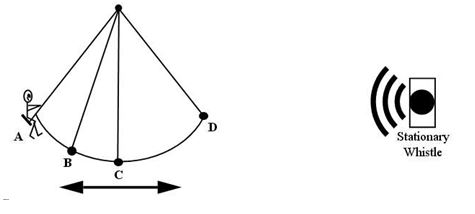
At which position(s) will the child hear the lowest frequency for the sound from the whistle?
A)at both A and D
B)at B when moving toward A
C)at B when moving toward C
D)at C when moving toward B
E)at C when moving toward D

At which position(s) will the child hear the lowest frequency for the sound from the whistle?
A)at both A and D
B)at B when moving toward A
C)at B when moving toward C
D)at C when moving toward B
E)at C when moving toward D

Unlock Deck
Unlock for access to all 67 flashcards in this deck.
Unlock Deck
k this deck
46
A periodic transverse wave is established on a string such that there are exactly two cycles traveling along a 3.0-m section of the string. The crests move at 20.0 m/s.
What is the frequency of the wave?
A)0.67 Hz
B)1.33 Hz
C)13 Hz
D)30 Hz
E)57 Hz
What is the frequency of the wave?
A)0.67 Hz
B)1.33 Hz
C)13 Hz
D)30 Hz
E)57 Hz

Unlock Deck
Unlock for access to all 67 flashcards in this deck.
Unlock Deck
k this deck
47
The diagram shows the various positions of a child in motion on a swing. Somewhere in front of the child a stationary whistle is blowing. 
At which position(s) will the child hear the highest frequency for the sound from the whistle?
A)at both A and D
B)at B when moving toward A
C)at B when moving toward C
D)at C when moving toward B
E)at C when moving toward D

At which position(s) will the child hear the highest frequency for the sound from the whistle?
A)at both A and D
B)at B when moving toward A
C)at B when moving toward C
D)at C when moving toward B
E)at C when moving toward D

Unlock Deck
Unlock for access to all 67 flashcards in this deck.
Unlock Deck
k this deck
48
An unstretched spring has a length of 0.30 m. When the spring is stretched to a total length of 0.60 m, it supports traveling waves moving at 4.5 m/s. How fast will waves travel on this spring if it is stretched to 0.90 m?
A)2.3 m/s
B)4.5 m/s
C)6.4 m/s
D)9.0 m/s
E)10.8 m/s
A)2.3 m/s
B)4.5 m/s
C)6.4 m/s
D)9.0 m/s
E)10.8 m/s

Unlock Deck
Unlock for access to all 67 flashcards in this deck.
Unlock Deck
k this deck
49
The car in the drawing is moving to the left at 35 m/s. The car's horn continuously emits a 2.20 × 102 Hz sound. The figure also shows the first two regions of compression of the emitted sound waves. The speed of sound is 343 m/s. 
How far has the initial compression traveled when the second compression is emitted?
A)0.77 m
B)1.56 m
C)7.7 m
D)15.5 m
E)35 m

How far has the initial compression traveled when the second compression is emitted?
A)0.77 m
B)1.56 m
C)7.7 m
D)15.5 m
E)35 m

Unlock Deck
Unlock for access to all 67 flashcards in this deck.
Unlock Deck
k this deck
50
The decibel level of a jackhammer is 130 dB relative to the threshold of hearing. Determine the decibel level if three jackhammers operate side by side.
A)65 dB
B)130 dB
C)133 dB
D)148 dB
E)260 dB
A)65 dB
B)130 dB
C)133 dB
D)148 dB
E)260 dB

Unlock Deck
Unlock for access to all 67 flashcards in this deck.
Unlock Deck
k this deck
51
Two motorcycles are traveling in opposite directions at the same speed when one of the cyclists blasts his horn, which has frequency of 544 Hz. The other cyclist hears the frequency as 522 Hz. If the speed of sound in air is 344 m/s, what is the speed of the motorcycles?
A)5.90 m/s
B)7.24 m/s
C)8.19 m/s
D)10.0 m/s
E)11.6 m/s
A)5.90 m/s
B)7.24 m/s
C)8.19 m/s
D)10.0 m/s
E)11.6 m/s

Unlock Deck
Unlock for access to all 67 flashcards in this deck.
Unlock Deck
k this deck
52
A train moving at a constant speed is passing a stationary observer on a platform. On one of the train cars, a flute player is continually playing the note known as concert A (f = 440 Hz). After the flute has passed, the observer hears the sound with a frequency of 415 Hz. What is the speed of the train? The speed of sound in air is 343 m/s.
A)7.3 m/s
B)12 m/s
C)21 m/s
D)37 m/s
E)42 m/s
A)7.3 m/s
B)12 m/s
C)21 m/s
D)37 m/s
E)42 m/s

Unlock Deck
Unlock for access to all 67 flashcards in this deck.
Unlock Deck
k this deck
53
A source moving through water at 10.0 m/s generates water waves with a frequency of 5.0 Hz. The speed of these water waves relative to the water surface is 20.0 m/s. The source approaches an observer who is at rest in the water. What wavelength would be measured for these waves by the stationary observer?
A)1.0 m
B)2.0 m
C)4.0 m
D)6.0 m
E)8.0 m
A)1.0 m
B)2.0 m
C)4.0 m
D)6.0 m
E)8.0 m

Unlock Deck
Unlock for access to all 67 flashcards in this deck.
Unlock Deck
k this deck
54
At a distance of 5.0 m from a point sound source, the sound intensity level is 110 dB. At what distance is the intensity level 95 dB?
A)5.0 m
B)7.1 m
C)14 m
D)28 m
E)42 m
A)5.0 m
B)7.1 m
C)14 m
D)28 m
E)42 m

Unlock Deck
Unlock for access to all 67 flashcards in this deck.
Unlock Deck
k this deck
55
The diagram shows the various positions of a child in motion on a swing. Somewhere in front of the child a stationary whistle is blowing. 
At which position(s) will the child hear the same frequency as that heard by a stationary observer standing next to the whistle?
A)at both A and D
B)at B when moving toward A
C)at B when moving toward C
D)at C when moving toward B
E)at C when moving toward D

At which position(s) will the child hear the same frequency as that heard by a stationary observer standing next to the whistle?
A)at both A and D
B)at B when moving toward A
C)at B when moving toward C
D)at C when moving toward B
E)at C when moving toward D

Unlock Deck
Unlock for access to all 67 flashcards in this deck.
Unlock Deck
k this deck
56
Two golf carts have horns that emit sound with a frequency of 394 Hz. The golf carts are traveling toward one another, each traveling with a speed of 9.5 m/s with respect to the ground. If one of the drivers sounds her horn, what frequency does the other driver hear? The speed of sound at the golf course is 345 m/s.
A)378 Hz
B)394 Hz
C)408 Hz
D)416 Hz
E)424 Hz
A)378 Hz
B)394 Hz
C)408 Hz
D)416 Hz
E)424 Hz

Unlock Deck
Unlock for access to all 67 flashcards in this deck.
Unlock Deck
k this deck
57
A loudspeaker at the base of a cliff emits a pure tone of frequency 3000.0 Hz. A man jumps from rest from the top of the cliff and safely falls into a net below. How far has the man fallen at the instant he hears the frequency of the tone as 3218.0 Hz? The speed of sound is 343 m/s. 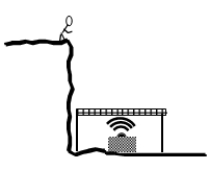
A)12.2 m
B)15.3 m
C)31.7 m
D)46.8 m
E)61.0 m

A)12.2 m
B)15.3 m
C)31.7 m
D)46.8 m
E)61.0 m

Unlock Deck
Unlock for access to all 67 flashcards in this deck.
Unlock Deck
k this deck
58
The car in the drawing is moving to the left at 35 m/s. The car's horn continuously emits a 2.20 × 102 Hz sound. The figure also shows the first two regions of compression of the emitted sound waves. The speed of sound is 343 m/s. 
What is the wavelength of the sound in the direction of motion of the car?
A)1.40 m
B)1.56 m
C)1.70 m
D)1.93 m
E)35 m

What is the wavelength of the sound in the direction of motion of the car?
A)1.40 m
B)1.56 m
C)1.70 m
D)1.93 m
E)35 m

Unlock Deck
Unlock for access to all 67 flashcards in this deck.
Unlock Deck
k this deck
59
A car moving at 35 m/s approaches a stationary whistle that emits a 220 Hz sound. The speed of sound is 343 m/s. What is the speed of the sound relative to the driver of the car?
A)300 m/s
B)308 m/s
C)340 m/s
D)365 m/s
E)378 m/s
A)300 m/s
B)308 m/s
C)340 m/s
D)365 m/s
E)378 m/s

Unlock Deck
Unlock for access to all 67 flashcards in this deck.
Unlock Deck
k this deck
60
A periodic transverse wave is established on a string such that there are exactly two cycles traveling along a 3.0-m section of the string. The crests move at 20.0 m/s.
What is the shortest horizontal distance from a crest to a point of zero acceleration?
A)0.38 m
B)0.75 m
C)1.5 m
D)3.0 m
E)6.0 m
What is the shortest horizontal distance from a crest to a point of zero acceleration?
A)0.38 m
B)0.75 m
C)1.5 m
D)3.0 m
E)6.0 m

Unlock Deck
Unlock for access to all 67 flashcards in this deck.
Unlock Deck
k this deck
61
A periodic transverse wave is established on a string such that there are exactly two cycles traveling along a 3.0-m section of the string. The crests move at 20.0 m/s.
How could the speed of the wave be increased?
A)by increasing the period
B)by decreasing the amplitude
C)by decreasing the frequency
D)by increasing the tension in the string
E)by increasing amplitude
How could the speed of the wave be increased?
A)by increasing the period
B)by decreasing the amplitude
C)by decreasing the frequency
D)by increasing the tension in the string
E)by increasing amplitude

Unlock Deck
Unlock for access to all 67 flashcards in this deck.
Unlock Deck
k this deck
62
A periodic transverse wave is established on a string such that there are exactly two cycles traveling along a 3.0-m section of the string. The crests move at 20.0 m/s.
How long does it take a particle at the top of a crest to reach the bottom of an adjacent trough?
A)0.018 s
B)0.038 s
C)0.075 s
D)0.150 s
E)0.30 s
How long does it take a particle at the top of a crest to reach the bottom of an adjacent trough?
A)0.018 s
B)0.038 s
C)0.075 s
D)0.150 s
E)0.30 s

Unlock Deck
Unlock for access to all 67 flashcards in this deck.
Unlock Deck
k this deck
63
A periodic traveling wave is generated on a string of linear density 8.0 × 10-4 kg/m. Figure A shows the displacements of the particles in the string as a function of the position x along the string at t = 0 s. Figure B shows the displacement of the particle at x = 0 m as a function of time. The particle positions are measured from the left end of the string (x = 0 m) and the wave pulses move to the right. 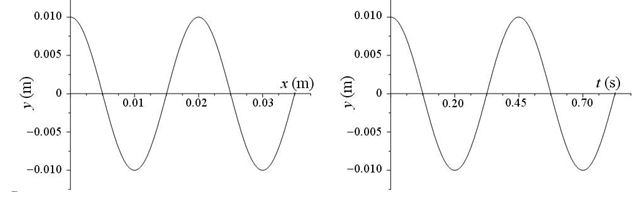
What is the tension in the string?
A)2 × 10-6 N
B)4 × 10-6 N
C)4 × 10-5 N
D)5 × 10-5 N
E)6 × 10-5 N

What is the tension in the string?
A)2 × 10-6 N
B)4 × 10-6 N
C)4 × 10-5 N
D)5 × 10-5 N
E)6 × 10-5 N

Unlock Deck
Unlock for access to all 67 flashcards in this deck.
Unlock Deck
k this deck
64
A periodic traveling wave is generated on a string of linear density 8.0 × 10-4 kg/m. Figure A shows the displacements of the particles in the string as a function of the position x along the string at t = 0 s. Figure B shows the displacement of the particle at x = 0 m as a function of time. The particle positions are measured from the left end of the string (x = 0 m) and the wave pulses move to the right. 
What is the amplitude of the wave?
A)0.01 m
B)0.02 m
C)0.04 m
D)0.07 m
E)0.7 m

What is the amplitude of the wave?
A)0.01 m
B)0.02 m
C)0.04 m
D)0.07 m
E)0.7 m

Unlock Deck
Unlock for access to all 67 flashcards in this deck.
Unlock Deck
k this deck
65
A periodic traveling wave is generated on a string of linear density 8.0 × 10-4 kg/m. Figure A shows the displacements of the particles in the string as a function of the position x along the string at t = 0 s. Figure B shows the displacement of the particle at x = 0 m as a function of time. The particle positions are measured from the left end of the string (x = 0 m) and the wave pulses move to the right. 
What is the wavelength of the wave?
A)0.005 m
B)0.010 m
C)0.015 m
D)0.020 m
E)0.025 m

What is the wavelength of the wave?
A)0.005 m
B)0.010 m
C)0.015 m
D)0.020 m
E)0.025 m

Unlock Deck
Unlock for access to all 67 flashcards in this deck.
Unlock Deck
k this deck
66
A periodic traveling wave is generated on a string of linear density 8.0 × 10-4 kg/m. Figure A shows the displacements of the particles in the string as a function of the position x along the string at t = 0 s. Figure B shows the displacement of the particle at x = 0 m as a function of time. The particle positions are measured from the left end of the string (x = 0 m) and the wave pulses move to the right. 
Determine the speed of the wave.
A)0.01 m/s
B)0.02 m/s
C)0.03 m/s
D)0.04 m/s
E)0.05 m/s

Determine the speed of the wave.
A)0.01 m/s
B)0.02 m/s
C)0.03 m/s
D)0.04 m/s
E)0.05 m/s

Unlock Deck
Unlock for access to all 67 flashcards in this deck.
Unlock Deck
k this deck
67
A periodic traveling wave is generated on a string of linear density 8.0 × 10-4 kg/m. Figure A shows the displacements of the particles in the string as a function of the position x along the string at t = 0 s. Figure B shows the displacement of the particle at x = 0 m as a function of time. The particle positions are measured from the left end of the string (x = 0 m) and the wave pulses move to the right. 
What is the minimum time required for the particles to return to their respective positions at t = 0 s?
A)0.1 s
B)0.2 s
C)0.3 s
D)0.4 s
E)0.7 s

What is the minimum time required for the particles to return to their respective positions at t = 0 s?
A)0.1 s
B)0.2 s
C)0.3 s
D)0.4 s
E)0.7 s

Unlock Deck
Unlock for access to all 67 flashcards in this deck.
Unlock Deck
k this deck


